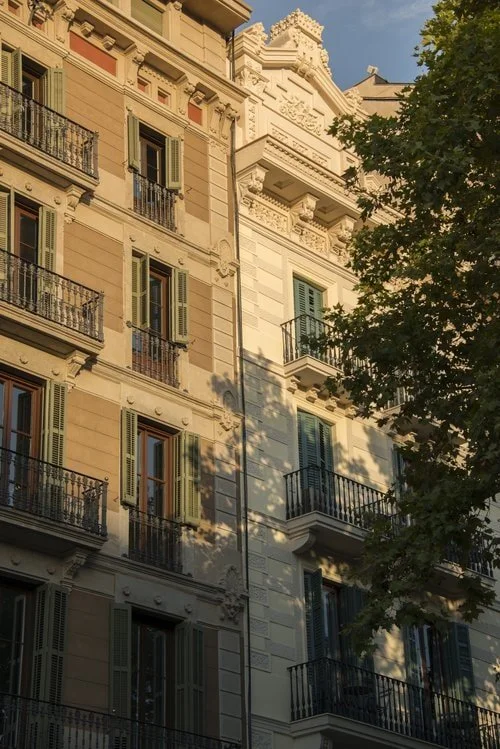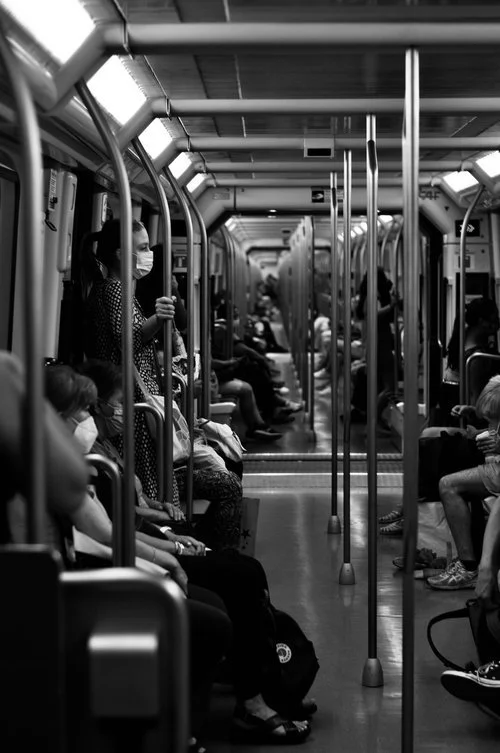Cost of Living in Barcelona
You’ve pondered prancing off on a new pursuit in uncharted territory. You’ve mentally gone through the motions of shoving as much as humanly possible into your suitcase. You’ve set your sights on one of Spain’s most vibrant destinations: Barcelona. So, here’s the big question: What is the cost of living in Barcelona?
Before venturing into the unknown, a little bit of investigation work needs to be done. From hefty rent prices and untamed nights out on the town to tapas bills and Spanish lessons, the cost of living here in the Catalan capital can surely add up.
Of course, your day-to-day living expenses will vary depending on your personal preferences, lifestyle, and income. Ditch the wavering debate and prepare ahead with the everyday essentials - rent, food, leisure, healthcare, bills, and public transport. Here are 6 Things You Need To Know About the Cost of Living in Barcelona, Spain.
Here’s what we cover in this guide:
Cost of Rent
Cost of Bills & Utilities
Cost of Public Transport
Cost of Healthcare
Cost of Leisure & Entertainment
Cost of Food
FAQs
6. What is the Cost of Rent in Barcelona?
When it comes down to living options, Barcelona is indisputably inundated with an inventory of possibilities. Scoping out the range of rental prices is one of the key points in planning a realistic budget.
So, is rent expensive in Barcelona? Housing costs depend highly on the neighbourhood. Generally, the average rent for a 2-bedroom apartment costs around €1100 to €1600 monthly.
These rates can be more expensive if you’re looking for something wholly furnished and if you’ve set your sights on the more luxe end of the scale. The typical studio apartment is around €800 to €1000.
In recent years, both accommodation and rental prices have soared due to the city’s increasing popularity. This has made shared houses the most common and affordable option for many. Standard room rates can be anywhere between €300 to €600.
Local tips: Step outside the centre of the city for cheaper rent. Look into Sagrada Familia, Poble Nou, Les Corts, and Poble Sec. Choosing wisely regarding the wealth of neighbourhoods is something to be taken very seriously, and it’s one of the most important things to know before moving to Barcelona.
From the multicultural melting pot of El Raval and the maze-like, millennia-old streets of El Born to the Modernista mansions in L’Eixample and the ritz and glitz of Sant Gervasi, these barrios are tailored to totally distinct tastes. The contrast of quirky neighbourhoods essentially offers you, each to their own, a different slice of how you want to experience this vibrant city.
If you’re wondering about the cost of living in Barcelona, you can get a good idea of what’s on the housing market by checking out Badi, Idealista, Habitaclia and Spotahome. You can additionally ditch the agency fees (if you book with a company or agent) by renting directly from the owner.
5. What is the Cost of Bills and Utilities in Barcelona?
Generally speaking, utilities are not included in the price of rent. But there’s no need to fear! Unaccounted-for utilities are relatively cheap and won’t leave much dent in your piggy bank.
Water, electricity, gas, heating, and Wi-Fi cost around €110 per month. Of course, your utility bills depend on your usage. If you’re planning on going ham, expect to pay more.
The cost of living in Barcelona can be relatively affordable, with maximum utilities around €150 per month.
Cheap phone plans can be found for as little as €10 to €15 through companies such as Simyo, Orange, and Vodafone. This is a serious bang for your buck compared to countries like the United States or Australia.
4. What is the Cost of Public Transport in Barcelona?
Transportation in Barcelona couldn’t be any easier, with a wealth of quick, affordable, and oh-so-convenient options. The metro, tram, funicular, FGC (Ferrocarrils de la Generalitat), buses, and bicycle sharing system are not expensive compared to other major European cities.
Navigate the full network of options available with this in-depth guide on How to Get Around Barcelona. Thanks to the city’s network of transport options, the cost of living in Barcelona can be very affordable, even if you travel often.
Costs for public transport are as follows:
One-way ticket: €2,30
T-casual (10 journeys): €11,35
T-Familiar (8 journeys): €10
T-Usual (1-month ticket): €40
3-month ticket: €140 - €150
Barcelona is a sound, cycle-friendly city, spanning a network of more than 200km worth of bicycle lanes, topped with specific traffic lights, signage, and expansive bicycle parking spaces.
Getting around this sunny Spanish city on a bike can also be effortlessly combined with public transport.
Local residents can use the city’s bike-sharing service, Smou (formerly known as Bicing).
3. What is the Cost of Healthcare in Barcelona?
Spain’s public healthcare system is free, provided you’re registered as a resident. It’s even coined as one of the best systems in the world, entitling residents to universal coverage. The specifics are as follows:
Expats in Barcelona can get free healthcare as long as they are:
Under 26 years old and are a student in Spain.
Employed and have a Social Security number.
State pensioners.
Pregnant women.
Children.
Have an EHIC (European Healthcare Insurance Card)
You can register for Spain’s public healthcare by first obtaining a Spanish social security number. Once registered, you can apply for a health card (tarjeta sanitaria individual or TSI). Spain’s free public healthcare system not only gives expats peace of mind but also makes the cost of living in Barcelona all the more economical.
Additionally, private health insurance is a popular option amongst expats. The cost of private insurance is around €50-200 per month, depending on the type of plan you’re after. Spain’s most prominent private health insurance companies are Allianz Care, APRIL International, Cigna Global and Globality Health.
2. What is the Cost of Leisure & Entertainment in Barcelona?
Stepping away from the business side of things, there’s no doubt Barcelona is packed to the brim with bars, nightclubs, festivals, restaurants, gyms, and events all ‘round. And this is where the cost of living in Barcelona can vary significantly.
Tapas-fuelled evenings, thrift shopping, speciality coffee stops, and mouth-watering craft beers can add up quickly. But alas, leisure and entertainment in Barcelona don’t necessarily have to break the bank.
From tapas-based bistros to alcohol-infused bars and classic Catalan restaurants, there’s a lil’ something to satisfy self-proclaimed foodies and gastronomy-intrigued visitors alike.
Eating out can be affordable, with numerous restaurants serving lunchtime meals (Menu del día) for around €12 to €15. A standard three-course meal at any mid-range restaurant costs about €25 per person.
There are many options to dabble between, depending on how you want to indulge. Check out this guide to the Best Places to Eat in Barcelona.
Public gyms will set you back anywhere between €30 to €90 per month. Pricing varies greatly depending on your preferences and the amenities available.
The standard cinema ticket is usually around €7 to €11, but there are particular days when you can score cheaper offers.
Festivals and theatre tickets are around the €40 to €50 mark, but obviously, if you’re seeing bigger productions or want to go hard at a 3-day techno festival, you should expect to pay a lot more than that.
Clubbing in Barcelona can be one of the most expensive activities. But in saying that, there are a few ways to get around it. Buying club tickets online and in advance not only allows you to save money on entry, but you’re guaranteed to get in. Standard entry fees are around 20€ and generally include a drink too.
1. What is the Cost of Food in Barcelona?
The city’s culinary culture is the crown of any authentic Barcelona experience. Barcelona’s gastronomy scene is threaded with the Mediterranean palate, and the typical dishes are predominate in olive oil, fresh vegetables, and fish.
Spain is the source of Tempranillo - it’s pinned as ‘Europe’s fruit and vegetable garden’. Thus setting food prices lower than you’d expect. Grocery shopping is not as expensive, with the average cost per person being €150 to €200 per month.
Standard items in the grocery store include:
1.5L water bottle: €0.70
1 bottle of wine: €5
Bottle of local beer: €1
1L bottle of milk: €0.90
Baguette: €0.80
500g of pasta: €1.30
1kg of rice: €1.15
250g of local cheese: €2.50
1kg of oranges: €1.50
500g of lemons: €1.70
250g packet of mixed lettuce: €1.50
1kg of tomatoes: €2
FAQS
Is it expensive to live in Ibiza?
The average cost of living in Ibiza is $1902 per month. This depends on your accommodation, how often to eat out and what type of lifestyle you’re living.
Is 1000 euros enough for a month in Barcelona?
If you live in a shared apartment, you can live with €1000 per month. This includes groceries, rent, public transport tickets and eating out at least twice. This varies, given the area you live in. For example, El Raval is more affordable, whereas Sant Gervasi is more luxurious.
How much do I need per month to live in Barcelona?
To live comfortably in Barcelona, it’s best to be earning at least €1300 to €1400 upwards per month. This includes rent, transportation, healthcare, groceries and some leisure activities.
What is the highest-paying job in Barcelona?
In Catalonia’s capital city, the best-paying jobs are surgeons, radiologists, judges, chief executive officers and chief financial officers.
If you’ve ever dabbled in moving to Spain’s northeastern gem, save yourself unwanted hassles and avoid first-time mistakes with this Guide to Living in Barcelona.
How Expensive is it to Live in Barcelona?
Compared to nearby European ex-pat destinations, this Catalan city sits on the more affordable end of the scale. At a glance, food and wine are less expensive (considering they’re produced locally), and both healthcare and public transport reinforce BCN’s status as a stellar spot to live.
The biggest expense of living in Barcelona is the rent prices, which can vary depending on where you live within the city. But with that aside, the cost of living in Barcelona generally comes down to your salary, lifestyle, and spending habits.
The cost of living in Barcelona can vary significantly depending on your choice of lifestyle, preferences and general spending habits. Compared to other major European cities like Paris or London, or even more expensive countries like the United States, the cost of living in Barcelona is quite affordable.
Are you planning on moving to Barcelona soon?







Rome is known for its historical monuments, colourful culture and delectable cuisine. There’s plenty to pack into your itinerary, but if you tire of Italy’s capital, escape on one of these day trips from Rome.